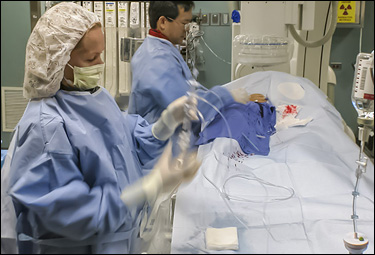|
EVERY
SECOND COUNTS - DO NOT PUT OFF SEEKING
MEDICAL ASSISTANCE! |
 |
If you start
researching the statistics for heart attack
survival a pattern quickly evolves.
The majority of people who do not survive
their first heart attack (or any heart
attack after their first) are typically a
long distance from a medical center equipped
with the proper cardiac emergency facilities
or they've waited too long to seek
help.
An estimated
735,000 people will experience a heart
attack in the US this year. Many of
these heart attacks (where the heart's
ability to function is greatly diminished)
will lead to cardiac arrest - where the
heart completely stops. Only 6% of the
people who experience cardiac arrest survive
if they are outside of a hospital when their
heart stops. In total, the
CDC (Centers for Disease Control)
estimates that over 610,000 people die from
heart disease in the US each year which is
roughly 1 in 4 deaths.
More than a
quarter of a million people each year
experience a severe heart attack caused by a
complete blockage of the blood flow to the
heart (called
an ST elevation myocardial infarction or
STEMI). It is
critical to restore blood flow to the heart
as quickly as possible by
opening the blocked vessel using surgery or
intravenous medication - otherwise the
patient WILL die. |
The American
Heart Association (AHA) and the American
College of Cardiology have presented
research and have established care
guidelines which state that heart attack (STEMI)
patients who seek treatment and have a "DOOR-TO-BALLOON"
time of under 90 minutes have a much greater
chance at survival and recovery.
|
 |
*In
my own case - it was 37 minutes from the
time my heart attack started in full until I
was in the
Cardiac Cath Lab being treated.
This is a Door-to-Balloon time of 37
minutes. And a large part of my
recovery can be attributed to the
outstanding care I received.
Even though I started having symptoms at 3am
it wasn't until around 9:45am (while I was
in transit to a cardiologists office) when
the symptoms came back and never eased off.
This was when my STEMI heart attack started.
I came into the emergency room of the
hospital at approximately 10:05am - prime
time to be treated for a heart attack
according to the AHA. |
 |
Early Action is
Important for Heart Attack for statistics
have shown that the faster a heart attack
patient can get treatment the greater their
chances for survival. Many
heart attack victims wait hours before
seeking help. Research from the
American Heart Association
shows that heart attack patients who arrive
at the hospital at nighttime, during the
weekend or on a holiday have a 13% increased
risk of dying, compared with patients who
arrive during regular hours.
|
|
WHY STEMI HEART ATTACKS ARE SO
DANGEROUS AND OFTEN FATAL: |
In a STEMI heart
attack there is sudden rupture of an
unstable part of the wall in a heart artery.
This leads to a build up of clot in an
attempt to heal it however this clot
formation results in total blockage of the
artery. This total blockage leads to loss of
blood supply to the heart beyond that point.
The heart muscle stops working within
minutes and soon dies unless the blockage
can be cleared and the artery can be opened
back up. For this reason every minute from
the onset of a heart attack is absolutely
critical. Often the patient doesn?t make it
to hospital due to sudden death. For those
who put off seeking medical attention too
long or for those in whom the heart attack
isn?t treated a STEMI heart attack is 100%
fatal.
For those who do seek
medical attention and survive the initial
event the damaged or dead heart tissue
cannot be regenerated and they are left with
a damaged heart; healthy, normally
functioning heart tissue is replaced by a
non beating scar. If enough heart
tissue is damaged and the resulting scar is
large enough - the patient is unable to
engage in many simple activities because
they now live with a damaged, compromised
heart.
CAD is the leading
cause of early disability in the United
States and is estimated to cost $316 billion
in heath care and lost productivity (these
are older numbers for 2011 provided by the
Million Hearts Project - an Official
Department of Health and Human Services)
|










